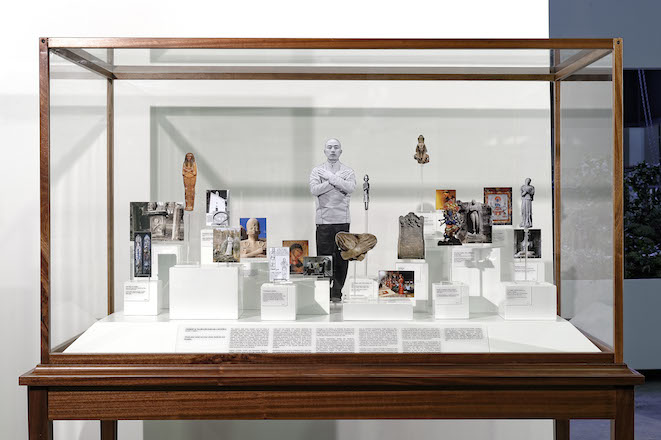WEB SPECIALS
THE ASIA CONVERSATIONS:
Xu Zhen with Matt Packer
Produced by MadeIn Company
Courtesy of Xu Zhen and MadeIn Company
Matt Packer: To begin, perhaps we could turn back to 2009 when MadeIn Company was first founded. Could you describe the decision to conceive of and develop your work under this name?
Xu Zhen: I wanted to build a special language and system to create art. The concept of “company” has its own specificities and functions in the art world, and therefore I established MadeIn Company in 2009. For us, MadeIn Company is a corporation producing creativity; people in the team work on different aspects, playing different roles. Under the name of MadeIn, we curate exhibitions, create works, open gallery spaces, organize events and so on. Last year, MadeIn Company launched the brand “Xu Zhen,” which constitutes one of MadeIn’s projects.
MP: Does MadeIn Company have a defining ethos?
XZ: The slogan or definition of MadeIn Company is that it is a contemporary art creation company, focused on the production of creativity, and devoted to the research of contemporary culture’s infinite possibilities. The name “MadeIn” plays with the idea of where things are produced and who is behind them. Also in Chinese, the name meiding (没顶) means “no roof,”—by extension no limit, no boundaries.
MP: Of course, there is an art historical tradition of fictionalizing artistic authority through the use of pseudonyms and collective identifications. MadeIn is quite precisely a company, with the implied affinities with commercialism and business practice. Is it fair to consider MadeIn Company as critical of these fictionalizing tendencies within artistic production, or is it more a genuine and strategic embrace of business-mindedness?
XZ: First of all, MadeIn Company is an art entity: it is a combination of elements, a language for and method of art production. Of course, the management and everyday working is similar to one of a company. As for the commercial aspect, the business participates in the process of art creation—not by following business rules, but by using the structure of a company as an aspect of creation.
Courtesy of Xu Zhen and MadeIn Company
MP: Many of MadeIn Company’s works are produced in series. For instance, the “Divinity” series (2011-2012), the “Turbulent,” action painting series (2012-2013), or the “Movement” series (2012) that uses the topography of demonstrations and riots as a graphic principle for a series of paintings. Could you say something about this approach to seriality, both as a method of distribution for artistic labours and as a kind of thematic unfolding over space and time?
XZ: This is like giving birth to children; the reasons are complicated and simple. They just come to be real when you want them.
MP: In works such as the “Movement” series (2012), and also in the “Revolution Castings” (2012), that are casts of stones collected from zones of conflict, there are clear references to political activism. Yet, these are also works that abstract and formalize the strategies of political activism as a series of “stunned” aesthetic objects. How did you first come to approach these political themes and develop your response to them?
XZ: I always hope to have my own position about certain matters, but by the end it is often in vain. As such, these series of works start from politics and become abstract. They present a process of energy transforming. Even though it is symbolical, it is practical.
MP: Do you feel an increasing or diminishing confidence among Chinese artists in the address of politically critical themes?
XZ: There is an old Chinese saying: “The misery of the state leads to the emergence of great poets.”
MP: You are currently working on a large survey exhibition at Ullens Center for Contemporary Art in Beijing. Could you describe your approach to the exhibition and the way it reflects your practice to date?
XZ: It is a retrospective exhibition which will also includes new works. The creating line isn’t a linear one. Relations between all the major works are being rethought and reorganized in the space.

Photo by Blaise Adilon
MP: Could you give an example of any new series of works being developed at the moment?
XZ: One of our main works is to continuously produce creativity. “Movement Field” (2013) and “Physique of Consciousness” (2011-2013) are works that are perpetually completed and developed. The exhibitions will also include new works.
MP: You also have a solo exhibition forthcoming at Galerie Nathalie Obadia in Brussels, and are undertaking a major commission for The Armory, New York, next year. This follows other successful exhibitions in Europe and the US. Given that you have been identified as an artist part of a “generation of artists who can express their Chinese experience without resorting to traditional Chinese identifiers,” do you approach exhibition making differently in non-Chinese contexts? Are there different critical challenges to overcome when presenting in these contexts?
XZ: “Chinese identifiers” are reproducible, these methods using “characteristics” can be learned and copied, but culture is different. It needs to spread; it isn’t merely about what something looks like, but more about how we approach it no matter what it resembles.
MP: Your exhibition at Nathalie Obadia is detailed as “MadeIn Company presents Xu Zhen,” putting yourself forward as a product of your own company’s creation. What can we expect from this exhibition?
XZ: MadeIn Company is a certain context of creation, in which and for which I create a new content.



